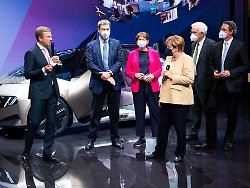Thursday November 11, 2021
Burning bans not wanted
Think tank: German car manufacturers are slowing down the traffic turnaround
Even German carmakers are no longer closing themselves to the change to e-mobility, but are actively accompanying it. But only on paper, criticizes the organization InfluenceMap. In Brussels, the Germans act as the biggest brakes on change. One car maker stands out in particular.
According to a British think tank, the German automotive industry is playing a double game when it comes to climate protection. “We see huge differences between green public relations and what companies actually do,” said Ben Youriev from InfluenceMap.Süddeutsche Zeitung“(SZ). On the one hand, associations and companies would promote climate-neutral and sustainable mobility, on the other hand they would fight for weaker climate rules in the EU.
According to the SZ report, InfluenceMap has requested and evaluated a number of documents on lobbying activities by German car companies in Brussels in recent months, with reference to the EU Freedom of Information Regulation. One conclusion of the study is therefore: “The German car manufacturers are leading the fight for weaker climate rules.” According to the information, the car manufacturer BMW and the Association of the Automotive Industry (VDA) were particularly negative.
The think tank criticizes the VDA most clearly, which is supposed to convey to politicians what companies do not dare to say out loud. In fact, the association, in which all manufacturers are members, recently stylized its auto show into a blueprint for climate protection. In Munich one experienced what the path to climate-neutral mobility could look like: with new drives, with bicycles and mobility services.
But in Brussels the car lobbyists are hindering the so-called traffic turnaround. The EU had already tried this for 30 years: “That didn’t work,” said a VDA letter to the EU from last year. It should be allowed to stay at all: a traffic turnaround should “not be a goal in itself”. Also at the trade fair, the association said that the planned departure from internal combustion engines was a clear signal in support of the Paris climate goals. A few months earlier, however, the VDA had written to Brussels: “We clearly reject a combustion engine stop.”
BMW continues to believe in the combustion engine
With the manufacturers, BMW lobbies most “aggressively” against climate protection, says analyst Youriev of the “Süddeutsche Zeitung”. For example, CEO Oliver Zipse met EU Transport Commissioner Adina Vălean on June 30th and declared that there should be “no rules for a ban on incinerators”, instead all available technologies should be improved – and the incinerator should also retain its legitimacy. BMW creates a completely different impression in advertising, according to Youriev, for example when the manufacturer fades in slogans such as “There is no planet B” or “Make Earth Cool Again” when introducing the new iX and i4 e-car models.
Now the automakers have to be credited for not hiding their position. Anyone who not only takes notice of the advertising will find statements by Zipse in the media, in which he invokes “technology openness”: In 2030, half of BMW cars should only run on electricity. But there should still be vehicles that run on gasoline, diesel, and perhaps synthetic fuels and hydrogen. The break shouldn’t go too fast, because otherwise it will cost a lot, money and jobs. The main argument, also from the VDA: The world is not ready for the exit everywhere.
According to “SZ”, the think tank also refers to the world climate conference COP26 in Glasgow, where two dozen states and six major car manufacturers signed a joint declaration on Wednesday to end the combustion engine. However, this does not include the federal government or most of the German car manufacturers. “Why don’t you sign when sustainability is your plan?” Complained InfluenceMap.
